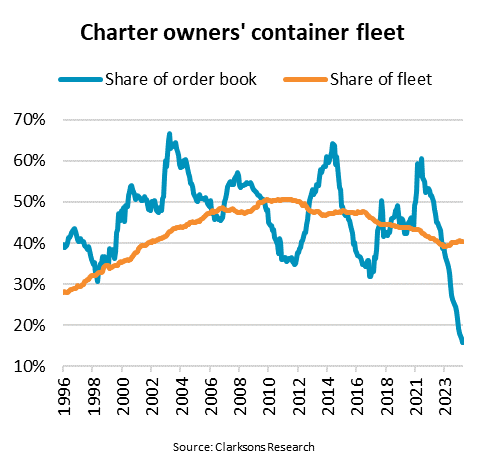The charter owners' container fleet has grown at an average annual rate of 3.2% for the past twelve years and currently stands at 11.7 million Twenty-Foot Equivalent Units (TEUs), according to a new report from BIMCO, the world's largest international shipping association.
"The operator owner's fleet has, however, grown faster, so the charter owners' fleet now makes up only 40% of total container fleet capacity, down from 50% in 2012,” said Niels Rasmussen, chief shipping analyst at BIMCO.
The charter owners' share of the container fleet has fallen every year during the past twelve years, but a third of the 10 percentage point fall in share occurred during the past three years.
Rasmussen noted that the last time the charter owners' share of the fleet was this low was in 2002.
The charter owners' share peaked at 50% of the container fleet between 2009 and 2012.
This peak coincided with the peak of the German KGs, which helped fuel the increase in charter owners' fleets during the 2000s.

"Today, the 20 largest charter owners control about 65% of the charter fleet. Four German owners remain in the top twenty list but no longer dominate it. More recent additions to the top 20 list are several Chinese leasing companies," said Rasmussen.
The share of the fleet fixed on short period charter contracts (less than 3 years) has also fallen along with the charter owners’ share of the fleet.
Meanwhile, the report said nearly 40% of the capacity of the charter owners' fleet is made of ships larger than 12,000 TEU.
These ships are generally fixed on long-term charters prior to delivery, and few, if any, have entered the short-term charter market.
Accordingly, a maximum of 25% of the total fleet's capacity is currently available for short-term charters.
BIMCO noted that the actual percentage is less as some smaller ships are also fixed on long-term charter contracts.
The report said the reduction in the charter fleet's share of the total fleet's capacity and the smaller share available for short-term fixtures have reduced operators' flexibility to quickly adjust their operating fleet up or downwards.
That flexibility is currently further limited as the very strong charter market during the COVID pandemic meant that more ships were chartered for longer periods, with some of those charter contracts yet to expire.
"In the coming years, the charter fleet's share of the total container fleet will continue to fall," Rasmussen said.
"Charter owners' order books have fallen from 3.4m TEU to just 1.0m TEU in only two years. It is now only 16% of the total order book and the operators' fleet will therefore grow faster," he added.



